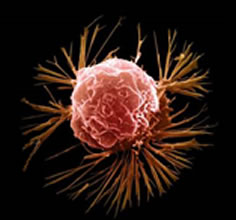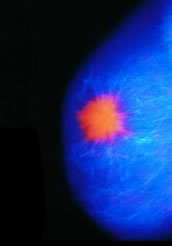Breast Cancer
Breast cancer is caused by abnormal,
uncontrolled growth of cells in the breast tissue. As in all other
forms of cancer, these cells fail to respond to normal growth
and developmental controls - as a result, they continue to grow
and divide into an abnormal mass called a tumor.

Scanning Electron Microscopy of breast cancer cell.
There are several types of breast cancers, the most common of
which is called infiltrating ductal cancer. This
type of cancer affects about 80% of all breast cancer patients,
and is caused by cancerous growth in the milk ducts.
Other types of breast cancer include lobular carcinoma
and inflammatory breast cancer.
Stages of Breast Cancer
Breast cancer is classified into stages, depending on the extent
of spread and growth of the tumor:
- Stage 0
Prior to tumor growth, abnormal cells begin to show pre-cancerous
changes (also called in situ changes). Here, the cells remain
localized and is not yet invasive.
Early treatment of cancer at this stage offers the best chance
of recovery.
- Stage I
Invasive growth begins - the tumor increases in size, but does
not yet spread to the lymph nodes.
- Stage II and Stage III
Invasive tumor that may have spread to the lymph nodes and tissues
nearby the breast.
- Stage IV
Invasive cancer that metastasized or has spread beyond tissues
nearby the breast. The tumor may spread to lymph nodes near
the neck, lungs, brain, liver, and other tissues.
Commonly, some doctors often describe cancers in terms of early
(Stage 0 to II), later (Stage II if many lymph
nodes are affected and Stage III), and advanced
(IV) stages to their patients.
Symptoms of Breast Cancer
The symptoms of breast cancer include:
- A single, painless lump in the breast
- Breast pain
- Rawness or itching of the nipple
- Discharge from the nipple
- Redness or swelling of the breast
- Change in breast shape or size
- Stippling or appearance of orange peel look (peau d'orange)
in the breast skin.

Colored mammogram showing breast cancer lump
Who Gets Breast Cancer?
Breast cancer is the most common form of cancer in women. It
is also the second leading cause of death (the first is lung cancer)
in women. In 2004, it is estimated that about 216,000 new cases
of invasive breast cancer and about 60,000 new cases of non-invasive
cancer are diagnosed in the United States.
The chance of developing breast cancer increases with age. Other
risk factors include genetic inheritance, alcohol use, sedentary
lifestyle and obesity.
Although rare, breast cancer can also occur in men. When it occurs
in men, this cancer tends to be very aggressive and difficult
to treat.
Prevention
Early detection and treatment of breast cancer are crucial, therefore
women are strongly recommended to perform regular breast exam.
For those between the ages of 50 and 69, yearly mammography exam
is generally recommended.
If you detect a lump during breast exam, contact your doctor
immediately.
Scientific evidence suggests that the risk of this cancer increases
with alcohol use, sedentary lifestyle, and obesity especially
if you have a family history of breast cancer. It is highly recommended
that women exercise regularly, limit alcohol use, avoid tobacco,
as well as maintain a healthy and ideal body weight to reduce
the risk of developing this disease.
What if it Occurs Before Menopause?
Pre-menopausal breast cancer tends to be :
- Fast-growing
- More aggressive
- Quicker to metastasize or spread to other locations
- More likely to occur in both breasts, instead of just one
- Estrogen receptor negative
This means that pre-menopausal breast cancer is less likely
to respond to anti-estrogen medications, such as tamoxifen.
Because of the abscence of estrogen receptor, chemotherapy and
surgery are the two remaining treatment options for most cases
of pre-menopausal breast cancer.
Breast Cancer Treatment
Treatments for breast cancer include:
- Antiestrogen medications
Estrogen-receptor positive cancer cells can be treated with
antiestrogen medications, such as tamoxifen.
Recently, newer class of drugs called aromatase inhibitors,
such as Arimidex and Femara,
are begining to replace tamoxifen as they have less side effects.
- Anti-HER2 receptors medication
A newer medication is Herceptin, a purified
anti-body that attacks HER2 receptors in cancer cells. Recent
clinical studies suggest that when added to chemotherapy, this
medication can cut the recurrence of cancer by more than 50%.
- Chemotherapy
Chemotherapy (colloquially, "chemo") is a systemic
or whole-body therapy. It involves the use of chemicals that
kill rapidly dividing cells, such as cancer cells. However,
it also has a significant side effects, as it also indiscriminantly
kill other rapidly dividing cells in the body, such as cells
in the hair and nail, blood, mouth, intestines, and vagina.
- Radiation therapy
Also called radiotherapy, this treatment uses high-energy radiation
beams to kill cancer cells.
- Surgery
There are two common types of surgery for this disease:
Lumpectomy with axillary node dissection
This surgery is used as treatment for stages 0 and I, as well
as smaller stage II cancers. Here, the tumor and the lymph nodes
beneath the arm are surgically removed.
Modified Radical Masectomy
The surgical removal of the breast, nipple and the area around
it, as well as the lymph nodes beneath the arm.
Breast Cancer Prognosis
When caught and treated early, the prognosis is good. When treated
at stage 0 and I, the survival rates after 5 years are 98% and
95%, respectively.
Mortality rate from breast cancer has been declining steadily.
Scientific advances and drug development mean that a woman diagnosed
with breast cancer today face a very different (and much more
positive) outlook than those diagnosed as recently as five years
ago.


